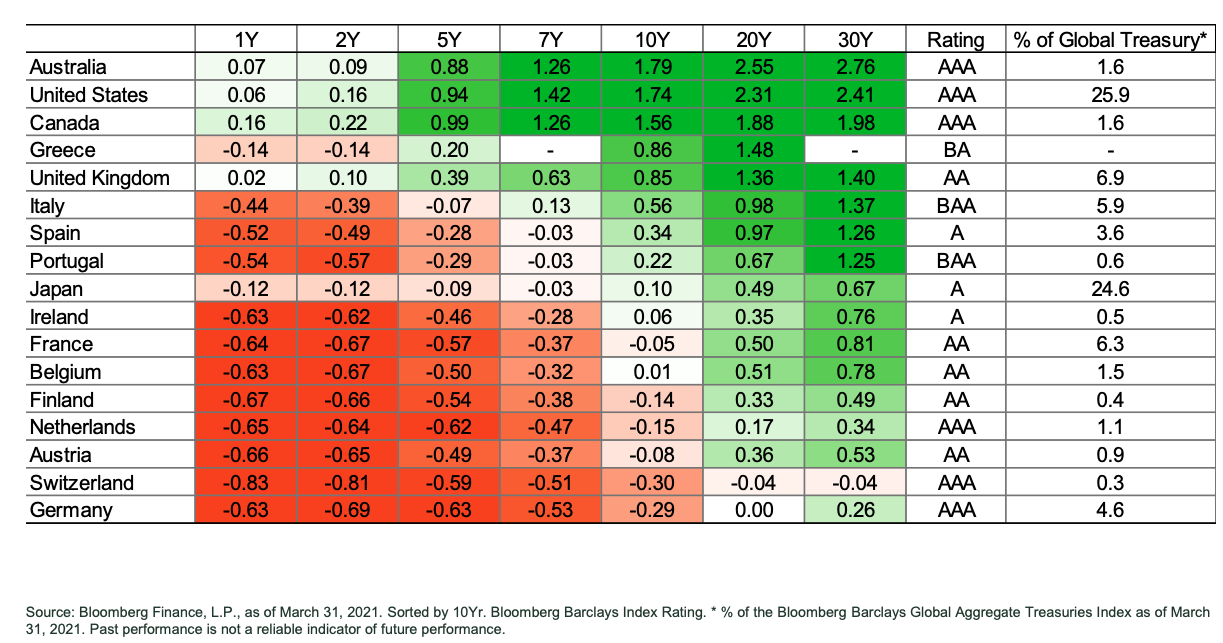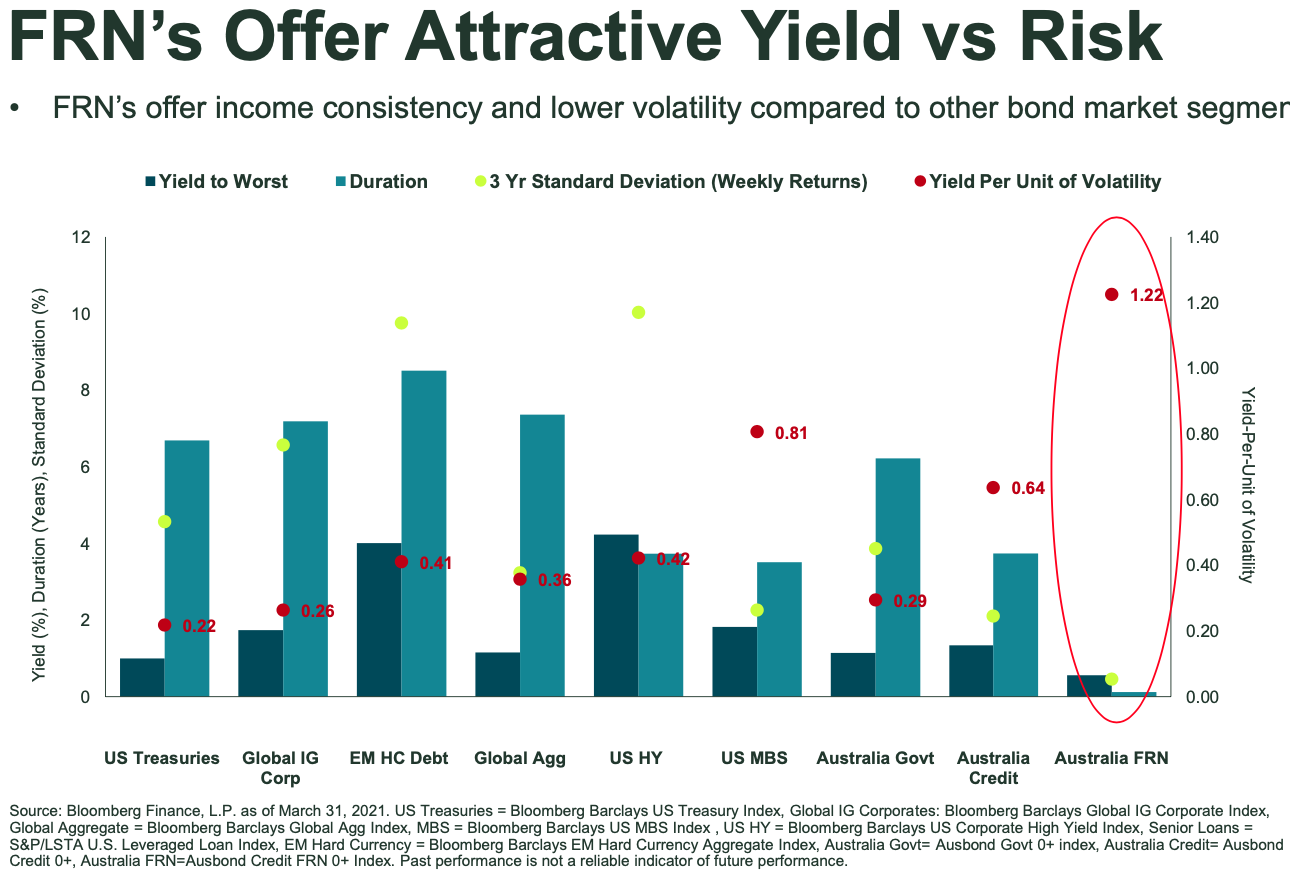State Street: “Bond risk has doubled but big banks safer than ever”
We’re in a place we could never have foreseen just 18 months ago, and in more ways than one. COVID, of course, blindsided everyone. But looking back a little over a year ago, when the pandemic sell-off hit, who would have thought economies would have recovered so quickly?
“You’re seeing incredible returns in your bond portfolio, but that’s because, by virtue of issuance, the bond market and the portfolio duration is getting longer and longer,” says State Street Global Advisors’ Simon Mullumby, CFA, head of Australian cash and bonds.
Australia, US Treasury yields stand above others

But in this environment, investors’ susceptibility to negative returns is two-fold as well. Pointing to the Bloomberg Composite Bond Index as of 26 May, Mullumby says the risk of that pool of bonds 10-years ago was 3.5 years, versus six years today.
“The risk of these bond portfolios has doubled over the last 10 years, that’s aided returns as yields have dropped, equity markets have gyrated and central banks have dropped the yield curve.”
Why has this happened, and what does it mean? In a local context, it’s mostly down to the RBA’s actions and the government policy activity on multiple fronts - and it’s the same story globally.
“With all the JobSeeker, JobFinder, Job-everything last year, we’re sitting on 5.5% unemployment which is similar to what it was pre-COVID. And the confidence numbers are roaring back,” says Mullumby.
“With the unemployment rate plummeting and the housing market where it is, there is confidence, and also the stimulus on the back of both fiscal and monetary policy measures.”
He notes that bonds have been quite volatile in 2021 so far and were at sub-minus-1% in December last year.
“At the moment, it’s at circa-1%, so it’s doubled on the back of COVID, yield curve control and central banks globally, including the RBA, putting as much fiscal stimulus into the system as possible.”
Though it’s all beer and skittles for now, he says the risk on the horizon is that yields will begin to push north again at some point.
“But what the RBA has done over the last 12 months has just been extraordinary, the Term Funding Facility has enabled banks to borrow money from the RBA out to three years at 10 basis points,” says Mullumby.
“That’s widely expected to be wound back in a month or so, at which point they’ll have to start borrowing from the market again.”
The current environment, he says, is great for portfolios that buy credit and great for issuance. Coupled with this are very strong credit conditions generally. On a more micro level, this also means the balance sheets of Australian banks are in rude health.
“And there is liquidity everywhere in the Australian money market. We see this as an opportunistic environment to add new credit notes to your portfolio in the coming months and years,” Mullumby says.
Why are banks booming?
There are three broad reasons Aussie banks are performing so strongly now, says Attilio Qualtieri, State Street Global Advisors’ senior cash credit research analyst.
- Fiscal policy support – sustained economic activity and helped banks’ loan performance
- Monetary policy support – helps to maintain market liquidity and debt market functioning
- Regulatory support – which provided banks with the flexibility to grow their balance sheets and assist borrowers, for example via the loan deferral program.
“Under this backdrop, Australia’s banks have performed exceedingly well…and the loan loss cycle now looks narrower and shallower than first expected, even though there are some challenges in certain sectors, there are clear benefits from the stimulus as well as the ‘de-risking efforts banks have undertaken since the mid-2010s.”
“From a loss-absorbency standpoint, you can make the case that the banks are the strongest they’ve ever been when you look at capital, reserves and pre-provision profitability.
Governance is another reason. This means, in a roundabout way, the devastating fallout from the Kenneth Hayne Royal Commission into banks and financial services has been a good thing for banks. This is because it forced them to look inwardly and tighten up lax regulatory oversight controls and compliance systems.
“We think the challenges of recent years will serve the sector well,” says Qualtieri.
Clouds are clearing, what’s next?
Of course, there are always other risks on the horizon. And while COVID is still on everyone’s radar – especially given Australia’s slow vaccine roll-out – the threat vector is now shifting for financial markets.
It’s not COVID any more, but bubbles and debt.
“In our recent investor survey, bubbles in credit and debt sustainability have overtaken COVID-19,” says Qualtieri.
“We talk about this unprecedented policy support and little sign of central bank tightening, but there is a balance between short-run benefits – for example, with home prices – and longer run implications, and I think the market’s grappling with that.”
His key takeaway is that back in 2020, on a global view, debt was led by sovereigns and corporate, which was as one would expect, rather than household debt.
And looking at Australia, housing is always a top consideration. “If you look globally, since 2017, Australia has actually underperformed peers in house price growth.”
“In the US, home prices are perhaps the highest they’ve ever been. So the point is that in Australia, it’s not a credit-fuelled home price boom.”
What does this mean? Macro-prudential policies - financial policies aimed at ensuring the stability of the financial system – are probably over time, but are unlikely in the very near term.
Back to the banks
This also flows onto banks, as mentioned earlier. They’re so well-placed for three key reasons:
- Very strong loan-payment culture
- Very low loan-to-value ratios across the board
- An “originate to hold” model as banks don’t often pass loans off to third-parties after origination.
Qualtieri points specifically to Commonwealth Bank (ASX: CBA) and Westpac Bank (ASX: WBC).
Annualised home loan losses for CBA, as shown in the following chart, are evidence of this.

Mullumby singles out Westpac, having recently issued a credit note in the global market.
“A five- to 10-year note in the US that ran to billions of dollars, this is the first such issue in a very long time for an Aussie bank offshore,” he says.
“This underpins expectations that banks will also soon start to issue in the Australian money market fund, which provides opportunities for credit funds, cash funds and bond funds.
Which credit instruments are most appealing?
“Historically, when banks typically issue in size locally, they issue in floating rate notes because they work for the balance sheet, funds, real money accounts and offshore accounts,” says Mullumby.
“Fixed issuance in the banks is limited, so the expectation is there will be many opportunities out there for bank senior unsecured floating rate issuance.”

“We like senior unsecured because it has the best liquidity of any notes in the market,” says Mullumby.
He points out that three-year and 10-year notes are currently selling off. “Our argument is that there’s already the demand. There was an issue from HSBC last week – at 0.42% - that’s not a market that is waiting for major issuance later this year.”
On that front, he expects there will be “sporadic issuance” but doesn’t expect a sizeable selloff.
So in this context, State Street suggests the most compelling opportunities are currently in senior secured floating-rate notes. “They offer a very good risk-return, they just don’t get marked down like fixed-rate bonds,” says Mullumby.
“We believe the opportunity to own floating rate notes, short interest rate duration, while still capturing yield is a much better trade than being long to the gills 30 or 40-year bonds.
“The market doesn’t wait for a print of inflation…they price when they see where the yield curve is. And the overriding position in the market is short-duration at the moment.”
Learn more
Simon actively seeks to invest in interest bearing investments of high credit quality, rather than investing in a predetermined basket of securities such as an index. He also aims to avoid exposure to companies that score unfavourably on financially material sustainability issues relative to their industry peers. Stay up to date with his latest insights by hitting the follow button here.
Four reasons to register for Livewire’s 100 Top-Rated Fund Series
Livewire’s 100 Top-Rated Fund Series goes live on 1 June 2021. Register now if you want:
- To get first access to a list of Australia’s 100 top-rated funds
- Detailed fund profile pages to help you compare performance, fees, and philosophy
- Exclusive in-depth interviews with expert researchers from Lonsec, Morningstar and Zenith.
- One-on-one videos and articles with 16 of Australia’s best fund managers
2 topics
2 stocks mentioned
1 contributor mentioned

